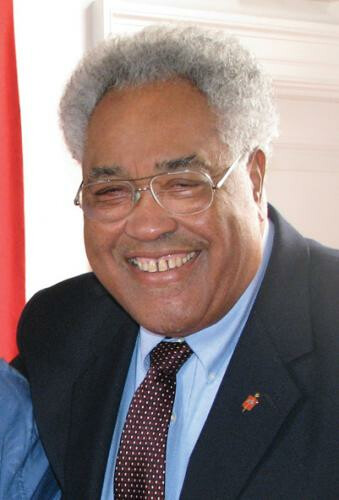
Celebrating 50 Years in the Pulpit
BY LESLI BALES-SHERROD
UMCONNECTION CORRESPONDENT
Bishop Forrest C. Stith was only 17 years old when it became clear to him that he wanted to be a pastor.
"And not just a pastor, but a rural pastor," chuckled Stith, now 74. "I had it all figured out."
 Fifty years into his ordination in The United Methodist Church, Stith has spent "zero" years serving rural congregations, he said with a grin. Instead, this Nebraska native ended up integrating the former Baltimore Conference straight out of seminary in 1958.
Fifty years into his ordination in The United Methodist Church, Stith has spent "zero" years serving rural congregations, he said with a grin. Instead, this Nebraska native ended up integrating the former Baltimore Conference straight out of seminary in 1958.
"It was an all-white conference, but churches were changing," Stith explained about the denomination, which was racially segregated from 1939 to 1964. "Washington was a mass exodus of whites to the suburbs, and churches were closing."
Douglas Memorial at 11th and H streets, in Northeast Washington was faced with a dilemma: a clause in the deed stipulated that, should the church cease to be a Methodist church in the Baltimore Conference, it would be turned over to the heirs of the woman who had given the land for the church.
Fresh from Drew Theological Seminary in New Jersey, Stith was dispatched to D.C.
"I came down with an empty building, no dollars, no budget and technically no membership," Stith remembered.
Stith "hit the streets," knocking on doors and visiting schools. With the help of Howard University, he started a summer children's program, followed by Sunday School, a membership class and a choir. By the end of Stith's first summer, Douglas Memorial had 35 new members.
This was quite a feat, when the Methodist Church was pushing mission, not membership.
"The Church turned its minds and hearts to delivery of services to the city and not on growing churches," Stith said. "Over the last 30 to 40 years, church membership has been declining, but in my day coming in, we were growing leaps and bounds everywhere - except in the city."
Stith spent nine years at Douglas Memorial. He went on to serve a total of 12 years as a pastor; 14 as a conference staff person and district superintendent; and 12 as an active bishop in the New York West area. Overseeing rural congregations in upstate New York finally put all those rural classes at seminary to use, Stith said.
"My rural ministry (training) did come in handy - just 40 years late," he laughed.
Stith has retired three times - in 1996, 2000 and 2001 - but he stays busy.
For the past several years, Stith has been working with the Black Caucus for Church Renewal Inc. and other concerned African-American Methodists to establish the African American Methodist Heritage Center.
The purpose of the center, he said, is to gather materials and artifacts that tell the story of African Americans in Methodism, while helping African-American congregation also preserve their stories.
"There is a documented presence of African Americans (in Methodism) since 1774, Stith said. "All through church history, African Americans have been vital, but we feared (they) would get lost in the maze. More than 90 percent of United Methodists in this country are white."
When Stith thinks back to what it was like to be the only African American in the conference, he jokes. "I couldn't miss meetings," he said, insinuating that his absence would have been obvious.
But he also speaks passionately about The United Methodist church as "the most pluralistic and diverse" in Protestantism.
"I've watched the struggle with racism, sexism, ageism and all the other ‘isms'," he said. "Our United Methodist Church is on the forefront ... of inclusiveness and righteousness."
To Stith, it all comes down to building relationships. Caring for people is the foundation of his 50-year ministry and this caring guides how he prioritizes his time and energy.
"It is what our purpose has been, even now in retirement," Stith added. "Of all the stuff on my walls - the awards, the doctorates - I value most the letters, notes and cards from people who, even to this day, remember our care for them."
The simple, yet profound importance of loving people especially struck him during the three years he and his wife, Josephine, served in East Africa, supervising new congregations and mission projects in Kenya, Rwanda, Sudan and Uganda.
"They had nothing, but they had love," he said. "Love is the answer and the essence of Jesus' ministry."
"I like the phrase the Council of Bishops uses: ‘to make disciples and transform the world,'" Stith said. "But I don't see those as sequential; they have to be simultaneous. We need to keep our eyes on the prize of the world itself and its systems that need transforming and need it badly."

Login/Register to leave comment